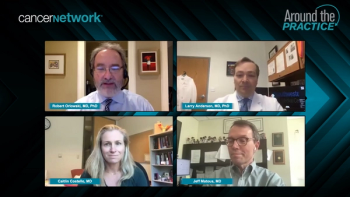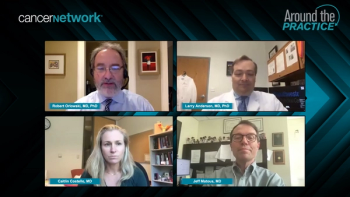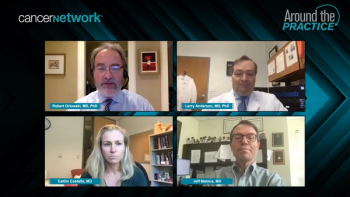
Kicking off a discussion regarding treatment approaches for transplant-ineligible multiple myeloma, a panel of hematologist-oncologists highlights goals of therapy for newly diagnosed patients.

Your AI-Trained Oncology Knowledge Connection!


Kicking off a discussion regarding treatment approaches for transplant-ineligible multiple myeloma, a panel of hematologist-oncologists highlights goals of therapy for newly diagnosed patients.

Different markers and tests that are used to monitor disease status and treatment response in patients with multiple myeloma.

Recommendations for measuring treatment response in patients with multiple myeloma utilizing tests such as MRD assessments.

Current techniques used to assess MRD status in patients with multiple myeloma, and advice to hematologist-oncologists who are considering flow cytometry or molecular testing.

Recommended next steps regarding treatment for patients with transplant-ineligible multiple myeloma based on prior responses to therapy.

A panel of hematologist-oncologists comment on how they would treat a 74-year-old patient with newly diagnosed transplant-ineligible multiple myeloma.

Scenarios for which a doublet regimen may be recommended over a triplet therapy for the management of newly diagnosed transplant-ineligible multiple myeloma.

Take-home points from the MAIA trial of daratumumab plus lenalidomide and dexamethasone as therapy for patients with newly diagnosed transplant-ineligible multiple myeloma, and recommendations regarding maintenance therapy following the use of a triplet regimen.

The rationale behind treating patients with newly diagnosed transplant-ineligible multiple myeloma (MM) until disease progression rather than stopping therapy at a designated point in time.

Triggers that may lead a hematologist/oncologist to consider reinstituting therapy for a patient with transplant-ineligible multiple myeloma (MM) who received prior therapy but was not treated to progression.

Recommendations when talking with patients with transplant-ineligible multiple myeloma (MM) who request to stop receiving treatment.

A panel of hematologists/oncologists conclude a discussion about transplant-ineligible multiple myeloma (MM) by reacting to current treatment gaps that need to be addressed.

Experts provide their recommendations for navigating a large and continuously growing treatment landscape, selecting between regimens, and monitoring patients with transplant-ineligible multiple myeloma.